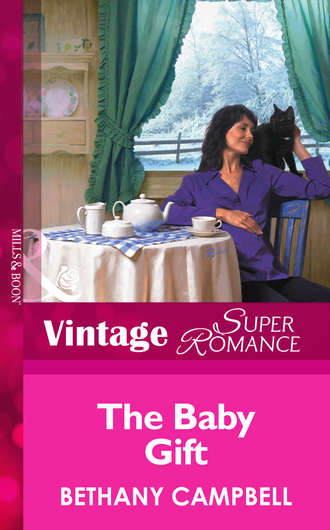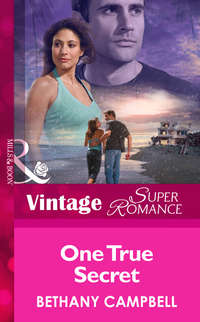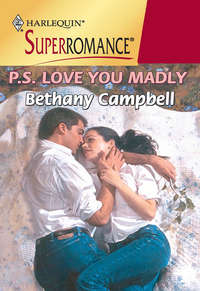
Полная версия
The Baby Gift
“So what exactly is your father doing these days?” he asked, trying to quash the sarcasm in his tone.
She detected it anyway. He could tell by the way her jaw tightened. “He’s owner and president, same as always. This whole business started with his vision.”
His vision, his brother’s sweat and his wife’s smarts, Josh thought. Leo Hanlon’s shaping dream had been a simple but good one. Most important, it came at exactly the right time.
Twenty-five years ago, the time of the small farmer in America was nearly over. People were not merely migrating to the cities, they were swarming there. Big farms gobbled up the small ones, and corporations bought out the big farms.
But America had begun as a country of farmers and settlers. Many who had gone to the cities missed the cycles of planting, growing and harvesting. They missed the feel of dirt between their fingers and the taste of tomatoes fresh-picked and still warm from the sun.
Leo Hanlon might not have succeeded as a farmer, but he prospered as a nurseryman. He supplied seeds and seedlings and potting mixtures to those city-dwellers who still yearned to garden.
But Leo’s true stroke of genius was not to sell just any seeds and plants. He specialized in the old-fashioned varieties with old-fashioned flavor. He was in short, one of the pioneers in heirloom gardening.
The big seed companies often didn’t offer the older classic breeds. Instead, they came up with new, improved, scientifically developed strains. They grew fast, uniformly and well. They just didn’t seem to taste as good.
Heirloom varieties were in vogue again, and across the country a few dozen places like Hanlon Heritage Farms kept gardeners in supply. Leo Hanlon’s mission was good. It was even noble. Josh sincerely admired it.
But Leo himself was a different matter.
When they first met, Josh had thought Hanlon likable, well-intentioned and slightly comic. But Josh had underestimated him.
Leo Hanlon had proved to be the strongest adversary he’d ever met.
The two of them waged a stubborn war, and Hanlon won, hands down. What he had won was Briana.
THE TRUCK PASSED between the gates of Hanlon’s Heritage Farms. We’re home again, Briana thought.
At least she and Nealie were home. She wondered how the farm looked to Josh’s worldly eyes.
The main farmhouse, where Leon lived alone, stood on the hill, a stark shape against the gray sky. Set in the valley was the ranch house Larry had built for his family. There were the old greenhouses as well as two new ones, modern and utilitarian.
Her house was on the next rise, clearly visible through the winter-bare trees. Her brother would be in one of the sheds, tinkering with the tractors. It was that time of year.
Her father would be in the room that served as his office, pottering with his endless notes. Was he watching? Did he suspect anything?
She glanced at Josh, who peered at the landscape, frowning.
“It looks pretty boring to you, eh?” she said. “It’s not exactly Moscow or Paris.”
“That’s not what I was thinking.”
“Oh?”
“I was thinking of the fields. They’d make a nice shot. A black and white abstract.”
Briana looked at the familiar fields. Snow filled the furrows but hadn’t stuck to the black ridges of dirt that ran between. The effect was like a painting, a great, complex design of sensuously rolling stripes.
How wonderfully he sees things, she thought. I think Nealie sees things that way, too.
Nealie stirred. “Are we home yet?” She rubbed her eyes with her fists. Josh took her glasses from his pocket and helped her settle them on her nose. “We’re home, Panda.”
The girl looked out the window, then settled against him with an air of contentment. “You’re really here,” she said to him. “I thought maybe I only dreamed it.”
“No dream, kid.” His voice was gruff. He kissed her tousled hair.
Briana’s emotions made a hard, painful knot in her throat.
“How long can you stay?” It was the third time Nealie had asked him the same question.
“I don’t know. As long as I can. A while, I guess.” For the third time he gave her the same answer.
“Then you have to go back to work,” Nealie said with unhappy resignation.
“But for now, I’m here,” he said. “With you.”
Briana pulled into her driveway, pushed the button to open the garage door and drove in. “I guess we can leave your things in the back,” she said to Josh. “There’s no sense unloading them. You’ll be going to the motel.”
He said nothing. He gave her a look that clearly said, We’ll see about that.
THE MOMENT CAME that Briana had dreaded.
Josh came down the narrow stairs. “She’s asleep.”
Briana stood by the couch, nervously folding the afghan. Josh had been upstairs for almost an hour. He had promised to read Nealie to sleep.
He crossed the room and stopped, looking at Briana. She felt threatened in a dozen conflicting ways. She was glad they had the couch between them, like a barrier.
“It’s time,” he said. “Now we talk.”
She paused, biting the inside of her cheek. At last she said, “Let me pour us some wine. I think I’m going to need a drink for this.”
She moved toward the kitchen, and he moved with her. He said, “Now what’s all this about artificial insemination and healthy embryos?”
Why do you have to start with the hardest question?
She tried to keep her hands from shaking as she took the wine from the cabinet and poured two glasses. But she knew what she had to say. She’d rehearsed it enough. The words came to her lips almost as if someone else were saying them, and she was only mouthing them, a ventriloquist’s doll.
She explained about the Center for Reproductive Health in St. Louis. There specialists could fertilize a group of eggs in vitro, a test tube union. The fertilized eggs would grow and divide until they produced what was called a blastocyst or pre-embryo.
When the pre-embryos were three days old, geneticists would test to see whether they showed signs of Yates’s anemia. If a fertilized egg was healthy, it could be placed in the mother’s womb before the end of the week.
“So that’s it,” Briana finished. “It’s pretty simple, really.”
“It’s anything but simple,” Josh said.
She shrugged and moved to the living room, wineglass in hand. She sat in the easy chair so he would be forced to sit on the couch. She crossed her legs. “Should I explain it again? I—I have some brochures and magazine articles and things if you want—”
He cut her off with a sharp gesture of his free hand. “The science I understand. At least well enough. It’s the ethics that bother me.”
“What do you want? Your ethics or your daughter’s life?”
The coldness of her voice surprised her. But he didn’t flinch, and his eyes didn’t waver from hers.
“What about the baby?” he demanded. “We bring a child into the world for one reason. To save another child who’s sick. Not because we want him, but because we don’t want to lose the one we’ve got.”
She raised her chin. “I’d love him. You know I would. I love children. I always wanted a big family.”
Josh shook his head. “And what am I supposed to feel for him? I mean, we’re talking about a child who’s mine, too, you know.”
She wished he’d sit down, but he stood in front of her as if rooted in place. She was ready for his argument. She’d anticipated it.
“Your feelings are your own business. But I know you. You’d care for him. You know you would.”
He studied her as if she were a being from another planet. “But suppose, Briana, it doesn’t work.”
She turned her face away so she wouldn’t have to look at him, but he went on, his voice relentless. “Suppose we have this child, but the transplant doesn’t work, and we still lose Nealie. What then? Is it the baby’s fault? Would you still want him? Or every time you looked at him, would you wonder why he was there but Nealie was gone?”
“Don’t talk about her being gone, dammit!”
“And how would he feel? Knowing that he was born not because we wanted a child but we wanted a donor? And, unfortunately, he just didn’t work out.”
She clenched her fist on the arm of the chair until she felt her nails cutting into her palm. “I said I would love this child. That love is without condition. I would love him no matter what happened.”
“Would you love him if he had Yates’s anemia?”
Her head jerked up, and she glared at him. “I’m trying to make sure neither of them has it. That’s the point.”
He turned from her with a sound that was part sadness, part disgust. He walked to the mantel and struck it with the flat of his hand. He swore. “What if none of these hypothetical embryos is healthy? What if they all carry the disease? What do you do then? Flush them away and start over?”
“You can freeze them,” she said, setting her jaw.
“Freeze them,” he mocked. “That’s nice. Do you have any other children? Yes, but they’re in the freezer. They would have been flawed, so we didn’t let them get born.”
“Someday there may be another way to cure this disease.” She shot the words back. “A sure way. Then they could be born and grow up safe.”
“There may not be another cure for years. Decades. What then? We just keep the little nippers on ice for eternity?”
“Someone else could bring them into the world,” she argued. “Someone who couldn’t conceive on their own. It happens all the time.”
“You’ve got all the pie-in-the-sky answers, don’t you?” he said. “I’m not asking for just myself, you know. Other people are going to be raising the same questions.”
“I don’t care about other people,” she said with passion. “I care about my daughter.”
“And your other child, too, of course. The one you want for spare parts.”
She could have slapped his face. Instead she took a long drink of wine. It tasted bitter as gall.
“I’m sorry,” he said. “That was a cheap shot.”
“Yes. It was.”
“But people will say worse things. About us. To us. And to our children.”
“I said I don’t care about other people. And what’s more, they don’t have to know. It’s none of their business.”
He blinked. He set his untasted wine on the mantel. He stared at her in disbelief. “They wouldn’t have to know?”
Her chin shot up. “I mean it. Why would they have to know?”
“Sweetheart, if you’re pregnant and you have a baby, somebody’s going to notice, I’ll guarantee you.”
“They don’t have to know how we did it. The center has a confidentiality agreement. Nobody else ever has to know.”
“And how do you explain this baby? Say we had a wild fling? And then we decided it wouldn’t work, but there’s a baby on the way, so what the hell, you’ll just go ahead and have it?”
“Why not?” she challenged. “People try to reconcile all the time, and it doesn’t work out. One of us got careless, I got pregnant. I wanted another child, so I had it.”
“Good Lord,” he said from between his teeth. “You’re something, you know that?”
“Isn’t it better?” she asked. “It’s a white lie, it’s not meant for an evil purpose. It’s just to protect us—all of us, the whole family.”
He picked up his glass and took a deep drink. “You should have been a lawyer. Your powers of equivocation are wasted on tomatoes.”
She ignored the gibe. “If the truth got out, it’d be a media circus. Other people have done this. They ended up being national news stories. Do you want that? Do you want it for Nealie? Or the baby?”
Suddenly he looked older, and more tired than she’d ever seen him. He rubbed his forehead. “The baby. You talk about this kid like he’s real.”
“He could be a she,” she said.
“Don’t change the subject.” He turned his back to her. He put his elbow on the mantel and leaned his forehead on his hand. “Look,” he said. “I don’t know if I can go through with this.”
Panic flooded her. “But you said—”
“I was in shock. I’m still in shock. None of this seems real.”
“Oh, Josh,” she said, her throat tight. “It’s too real. You’ve seen her. How little she is. How frail.”
He made no answer.
She said, “We have two choices. We can do nothing for her. Or we can do—this.”
He swore.
Desperate, she said, “It’s hard to accept, I know. It’s taken me two months to come to terms with it.”
She knew immediately she’d said the wrong thing. She saw the tension seize his body. For a moment he was as immobile as if turned to stone.
Then he dropped his hand from his eyes, straightened and turned to face her. “You’ve known about this for two months?”
“I—I guess I was—in denial.”
“Oh, please,” he said with contempt, “spare me the psychobabble.”
“If that’s the wrong word, I don’t know the right one.”
“My child’s seriously ill and you waited two months to tell me?”
“I couldn’t face it. I couldn’t talk about it. I couldn’t believe it. I had to think about what to do.”
He glared at her. She knew she deserved it. Tears welled in her eyes.
“I’m sorry. Be as angry as you want. But take it out on me. Not her.”
He put his hand to his forehead again. “Look, I’m still on Moscow time. I’ve got jet lag. Denial’s a lousy word. But I understand what you mean. Maybe I can’t forgive, yet. But I understand.”
She knew what he felt—grief, fright, anger and a terrible sense of isolation. He was full of the same roiling welter of emotions that had overwhelmed her when she’d first learned. And he was clearly exhausted, as well.
“Oh, Josh,” she said. “you need rest. Let me give you the keys to the truck.”
He said nothing, just stood there with his eyes covered.
She rose from the chair, then stood behind it, clasping its back, unsure what to do. “I’d drive you, but I can’t leave Nealie alone. I—I could call Poppa. It’s still early. You could just walk over there.”
He shook his head no. “I don’t want the keys. I certainly don’t want Poppa.”
“Then…”
He dropped his hand and met her gaze. He moved to her with a quickness that belied his fatigue. His hands gripped her shoulders. “What I want,” he said, “is you.”
Then his arms were around her, and hers were around him.
They clung to each other so desperately it was as if they were trying to forge their two bodies into one. She wanted to be as close to him as possible.
“Briana,” he said, “oh, Briana.”
Then his mouth was on hers, as hungry and seeking as her own, and she was lost in her need for him.
CHAPTER FOUR
HE WANTED HER. He had always wanted her. But never this much and never this badly.
She was the only one who understood—who could begin to understand—what he felt for his child, the depth of it, the complexity, the pain, the fear. To hold Briana meant he was not alone, that there was one person who shared the unspeakable emotions that tore him.
Yet it was more. She was not just a person, she was Briana, and he loved her. Together they had created a child, and together, God willing, they might save her.
But it was all tangled together in his head, the looming terror of loss, the wild desire to fight for his daughter’s life and his sheer, aching physical need for not any woman, but this woman.
She felt the same for him. He knew she did. He could sense the need and yearning coursing through her body.
He took her face between his hands. Her skin felt soft and flawless as the finest silk. He kissed her so deeply it dizzied him. Behind his closed eyes, lights danced and exploded, dying into darkness, then exploding again.
“Don’t—” she whispered against his mouth.
“Yes,” he said, and when she turned her face away, he kissed the smooth spot beneath her ear.
“No.”
“Yes.”
“Don’t—please. Please.”
“I need you,” he said, his lips against the throbbing vein in her throat. “I need to hold you. Hold me. Be with me.”
She struggled to pull away. The movement seemed tinged with both reluctance and determination.
“Don’t,” she said for the third time, and to his despair, she seemed to mean it.
He gripped her shoulders. “We need each other. You know it. I know it. Let it happen.”
He tried to kiss her again, but she drew back, shaking her head. “We can’t. That’s not why I asked you here.”
His clasp tightened. “You said you’d tell people we had an affair. It doesn’t have to be a lie. Let that part be true.”
She refused to meet his eyes. He could feel her body turning more rigid. “It can’t be true,” she said. “We can’t do anything. For lots of reasons. For one, you—you’re supposed to—to refrain from ejaculation for now.”
She’d done it to him again. He was stunned. He could only stare at her, uncomprehending. “I’m what?”
She raised her face to his, her face defensive but stubborn. “Refrain. At the lab they’ll need to test your semen. They’ll want a good sample. And I’ll be taking fertility drugs. I have to. I have to—to give them multiple eggs.”
“Multiple eggs? You make yourself sound like the Easter rabbit.”
“Don’t laugh,” she warned. “I’m serious. We can’t make love. It’s what the lab ordered. We go Monday.”
His groin ached, and his head was beginning to hurt. “What about afterward?”
“No. I told you. I’ll be taking hormones. Something might go wrong. I won’t chance an accidental pregnancy.”
“I thought the point of me being here was that we have another child.”
Her chin quivered. “The point is that we have a healthy child.”
A slow resentment was rising in him. “You must have been damn sure I’d go along with doing it your way.”
“No. I wasn’t sure. I just prayed you would.”
“And what if I said let’s not do the bit with the lab and the mad scientists. Let’s have a kid the old-fashioned way.”
To his consternation, her eyes filled with tears. “I couldn’t stand to take the chance. I couldn’t stand to have another child at risk the way she is. I’d rather die. You can call me a coward, but I c-couldn’t.”
She began to cry, and she was a woman who cried so rarely that the sight half-killed him. He understood her torment and hated himself for fueling it. “You’re not a coward,” he said. “Not you. Never you.”
He folded her into his arms, gently this time, making no erotic demand, only holding her and letting her weep. “We’ll do it your way,” he said. “You’re right. The baby will be safe. Shh. Our baby will be strong and healthy and fine.”
Our baby, he thought with a conflict of emotion that half-dazed him. We won’t make love. But we’ll have a baby.
At last her tears slowed, then stopped. She stepped back from him, shamefaced, wiping her eyes. “I’m sorry. I didn’t mean to do that.”
“Maybe you needed to do it.”
“I’ll try not to do it again.”
He looked at her streaked face. “In all my life I’ve only seen two woman who could cry and still be beautiful. Ingrid Bergman—and you.”
She gave him a weak smile that made his heart twist in his chest. His desire for her hadn’t vanished. It intensified so keenly that it hurt.
“I should go.” He said it abruptly, but she didn’t look surprised.
She seemed to understand and nodded. “I’ll get you the keys.” She went to the kitchen counter, where her handbag lay.
To have something to say, he asked, “Did my package for Nealie come?”
She opened her bag, took out the keys. “Yes. I put it away for Valentine’s Day, like you asked. She doesn’t know it’s here.”
“Maybe I should give it to her tomorrow,” he said. “I didn’t have time to buy her much in Moscow. I’ll get her something else for Valentine’s.”
She came to him, dropped the keys into his outstretched hand. “Whatever you want,” she said.
He knew he needed to leave before the urge to take her in his arms again grew irresistible. He fingered the keys. “I’ll leave. For now.”
“Yes,” she said. “There’s more to talk about, of course.”
“Of course. What we tell Nealie about this. About the baby.”
“Yes. That’s the hardest part. But it’s late. And you’ve had a long trip.”
“Yeah.” At this point it seemed a thousand years long.
She walked him to the door. He wanted to kiss her goodbye. He confined himself to the lightest brushing of his lips against her cheek. She did not return the caress. She only gave him a small, pensive smile.
“So I guess it’s good-night,” he said.
“I guess it is.”
She opened the door for him. He paused halfway through it and turned to her again. “Call me as soon as Nealie wakes up.”
“I will,” she said. “Get rested. Do you remember the way to the motel?”
“I think so,” he said. He remembered. He had been back to it in his memory too many times to forget.
He closed the door and walked alone into the night.
BRIANA HEARD HIM drive off. Then she sat in the silence, rotating the stem of her wineglass and staring at the dancing flames in the fireplace.
She had not been surprised by the fervor of Josh’s embrace or the hunger of his kiss. Her eager response didn’t shock her. Perhaps it should have shamed her, but it did not.
In spite of everything, they still desired each other. And they both loved Nealie. Those two things would never change. Perhaps loving Nealie made them want each other more—pain sometimes needed the narcotic of touch, fear needed the consolation of nearness.
Briana put her hand to her temple, for it ached. She considered herself a simple woman whose life had become too complex. Josh was a wonderful man and a devoted father. She loved him, and he loved her in return, but they could not live together.
She loved this place, this farm, this work, and she could not leave it. It was her home, and her father needed her. The business could not survive without her. Her father could not survive without her. He was an unhealthy, absentminded man who, left to his own devices, forgot to take his pills or eat right or do his exercises.
No, Briana belonged to this place as surely as if she were one of the plants rooted here.
But Josh belonged nowhere, or else he belonged everywhere. The far places on the map called him, the siren stories chanted out for him come and help tell their tales, and he always went.
For five months he’d tried to stay on the farm, pretending to be a steady man committed to a steady place. He worked to learn a business foreign in every way to his nature. What he learned was to hate compost and pruning and predatory insects.
Then his agent had phoned with the irresistible offer to cover the trouble in Albania, and Josh had wanted to go. He wanted Briana to go and wait for him in Italy. Briana thought it all sounded too unsafe, especially with a baby on the way.
With horror, she realized her husband liked danger, that it tempted him with a lure just as strong as that of distant lands and exotic sights. Then her father had his heart attack. She could not leave him.
After that, the marriage swiftly unraveled. But their love for their daughter never changed. And the old undercurrent of desire that had drawn them together, that, too, stayed strong as ever. Briana had found that although pride was a cold bedmate, it was a safe one.
She rose to empty the wineglass and tidy the kitchen before she went to bed. She was emotionally exhausted, and Nealie would be up early, wanting her daddy.
Halfway to the kitchen, she heard a knock at her door. She turned and went to answer it. Her father stood on the little cement porch, a knitted cap pulled over his ears, a matching muffler wound around his neck.
“Poppa,” she said in surprise. “It’s cold. Why are you out?”
“I came to see if you were all right,” Leo said, stepping inside. He looked at her living room suspiciously, as if were somehow contaminated. Then he gazed studiously at the wineglass in her hand. “Does he have you drinking alone? I hope it’s not come to that already.”







